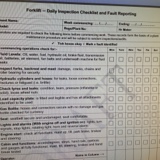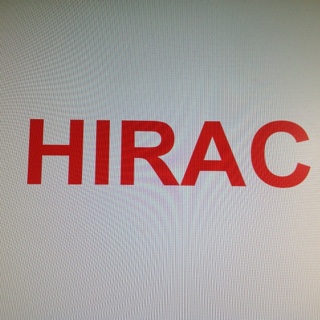Audit / Inspection Details
-
Title of Compliance Audit
-
Inspected by
- Michael Fitzalan
- Stuart Roach
- Peter Brunt
- Kelly Brown
- Besim Sinanovski
-
Audited/Inspected by:
-
Council Worksite / Asset or Contractor
-
Section
-
Section Line Manager
-
Team Leader / Coordinator
-
Worksite Supervisor
-
Health and Safety Representative (HSR)
-
Date and time of compliance inspection
-
Location
-
Contact Name and Details (PCBU)
-
Location
-
Location
Worksite Inspection
- 1. Worksite Access (Road access and signage)
-
1.1 Is there sufficient signage in place advertising work in progress?<br>
-
1.2 Are traffic controller ahead signs in place (Stop / Slow)?
-
1.3 Are flashing hazard lights being used and working?
-
1.4 Are sufficient traffic cones or bollards in use?
-
1.5 Are all access and side tracks secured from unauthorised public entry?
-
Other safety issues
Safety issue
-
1.6 Safety Issues
2. Worksite Entry and Traffic Control (Vehicle and Pedestrian).
-
2.1 Is signage in place for "No Unauthorised Entry"?<br>
-
2.2 Are all persons must report to site office or site controller displayed?
-
2.3 Is PPE required for site displayed?
-
2.4 Worksite speed limit displayed?
-
2.5 Site contact names and numbers displayed?
-
2.6 Is the site secure from unauthorised entry of vehicles and/or traffic?
-
2.7 Are spotters provided to control and direct pedestrian and vehicle traffic (where required)?
-
2.8 Is a formal traffic management plan (TMP) available for the worksite (If required)?
-
Other safety issues
Safety issue
-
2.9 Safety Issues
3. Site Office / Crib Hut -
3.1 Are there designated parking areas for plant, workers and visitors?
-
3.2 Is there a WHS notice board displayed?
-
3.3 WHS policy displayed, signed by senior management and current?
-
3.4 Is a site induction conducted?
-
3.5 Are responsible persons names and titles displayed?<br>Site Manager<br>Superintendent<br>WHS Officer<br>Worker Safety Representative<br>Work Health and Safety Representative (HSR)<br><br><br>
-
3.6 entry and exits clearly marked?
-
Other safety issues
Safety issue
-
3.7 Safety Issues
4. Visitor Controls
-
4.1 Are visitors required to formally sign-in and out?
-
4.2 Is the visitor to be escorted at all times while on site? (If yes, a basic induction is only required).
-
4.3 Is a means of identifying visitors implemented?
-
4.4 Are visitors advised of emergency procedures?
-
4.5 Are areas where visitors are not permitted clearly identified / explained?<br><br><br>
-
4.6 Is suitable PPE provided to visitors?
-
Other safety issues
Safety issue
-
4.7 Safety Issues
5. Sub Contractors
-
5.1 Are contractors made aware of company WHS policies and rules before commencing work<br>
-
5.2 Do engaged contractors provide adequate insurances (Workers Compensation and Public Liability to 20 Million)?
-
5.3 Are sub-contractors safety systems and consultation arrangements harmonised with the engaging PCBU?
-
5.4 Are sub-contractors management systems provided to the principle PCBU?
-
5.5 Are checks made of the contractors plant and equipment for compliance and safety?
-
Other safety issues
Safety issue
-
5.6 Safety Issues
6. Emergency Procedures
-
6.1 Are emergency procedures displayed?
-
6.2 Emergency services 000 and PCBU names and numbers?
-
6.3 Site map available?
-
6.4 Are training drills conducted periodically, verbally at toolbox talk and practically exercised (6 monthly)?
-
6.5 Is there an effective alarm system in place?
-
6.6 Muster / Assembly point identified?
-
6.7 Fire equipment available and tagged for currency?
-
Other safety issues
Safety issue
-
6.8 Safety Issues
7. Communication
-
7.1 Is communication available (Phone, radio, satellite)?
-
7.2 Does the worksite have agreed radio contact numbers for various locations?
-
7.3 Do all workers on-site know the radio numbers for locations?
-
7.4 Do workers understand basic hand signals (i.e. Stop)?
-
Other safety issues
Safety issue
-
7.5 Safety Issues
8. First Aid - First Aid Code of Practice
-
8.1 Qualified first aid names displayed (First aid level).
-
8.2 Medical supplies checked for currency and expiry date?
-
8.3 First aid kits for workers on-site within easy access?
-
8.4 Medical supplies and facilities are adequate for the nature, location and composition of workers on site?
-
Other safety issues
Safety issue
-
8.5 Safety Issues
9. Workplace Amenities
-
9.1 Toilets available on site?
-
9.2 Are toilets provided for each gender?
-
9.3 Washing facilities provided?
-
9.4 Are toilets and shower areas cleaned regularly?
-
9.5 Are sufficient consumables made available in washrooms and toilets?
-
9.6 Are sufficient tables and chairs provided?
-
9.7 Are lunchroom, kitchen facilities clean and hygienic?
-
9.8 Is clean drinking water provided?
-
Other safety issues
Safety issue
-
9.9 Safety Issues
10. Consultation (Pre-start briefs, toolbox talks)
-
10.1 Is there a WHS project or site specific plan in place?
-
10.2 Do all workers have their General Construction Card on-site?
-
10.3 Are pre-start shift meetings conducted?
-
10.4 Are toolbox talks conducted periodically to discuss safety issues between worker and management?
-
10.5 Are there worker safety representatives I.e. HSR
-
10.6 Do workers understand the PCBUs legal responsibilities for consultation?
-
Other safety issues
Safety issue
-
10.7 Safety Issues
11. Personal Protective Equipment (PPE)
-
11.1 PPE allocated to workers specific to activities (Australian Standard)?
-
11.2 Workers wearing PPE required by company policy?<br>
-
11.3 High visibility clothing?
-
11.4 Hard hat and wide brim hat?
-
11.5 Fully enclosed footwear?
-
11.6 Are signs displayed where specified PPE must be worn?
-
11.7 Is PPE fitted correctly, serviceable and in good condition?
-
11.8 Do workers wear PPE when mandated in SWMS?
-
Other safety issues
Safety issue
-
11.9 Safety Issues
12. Manual Handling (Hazardous Manual Tasks Code of Practice)
-
12.1 Is a risk assessment conducted for manual tasks (heavy lifting or strenuous work)?
-
12.2 Are workers trained in lifting practices?
-
12.3 Do workers request assistance for heavy or awkward lifting tasks?
-
12.4 Do workers warm before heavy lifting to avoid strain injuries?
-
12.5 Are adequate rest breaks allocated to allow workers time to recover?
-
Other safety issues
Safety issue
-
12.6 Safety Issues
13. Safety Issue, Hazard Reporting and Controls (Hierarchy of control)
-
13.1 Are safety issue / hazard and near miss reporting forms available on-site
-
13.2 Do workers understand the procedure for reporting safety concerns (Stop work, apply control or report to supervisor)?
-
13.3 Are risk assessments conducted to identify site hazards with controls implemented?
-
13.4 Do workers know and refer to the hierarchy of control?
-
Other safety issues
Safety issue
-
13.5 Safety Issues
14. Incident Reporting and Investigation
-
14.1 Are incident / injury forms available on site?
-
14.2 Do workers report all incidents ASAP?
-
14.3 Are all incidents fully investigated and effective remedial action implemented?
-
14.4 Are WorkCover NSW "Notifiable Incidents and Preservation Site", regulations clearly understood by the PCBU?
-
Other safety issues
Safety issue
-
14.5 Safety Issues
15. Safe Work Method Statements (SWMS) - Code of Practice for Construction Work
-
15.1 Have workers been inducted and consulted, in the development of SWMS?
-
15.2 Are SWMS systematic with steps, hazards and controls?
-
15.3 Are SWMS specific to the activity and easy for workers to understand?
-
15.4 Do all workers understand SWMS and are they signed off?
-
15.5 Are SWMS monitored and reviewed for effectiveness?
-
15.6 Are SWMS provided to the principle contractor?
-
15.7 Do SWMS meet the minimum standards required by applicable Codes of Practice?
-
Other safety issues
Safety issue
-
15.8 Safety Issues
16. Plant (General) - (Evidence required i.e. documentation)
-
16.1 Has plant been assessed as safe to use and complaint to Australian standards?
-
16.2 Are operators trained and Verified as Competent (VOC); is evidence available?
-
16.3 Are daily pre-start checklist completed and faults reported?
-
16.4 Are repairs and maintenance conducted in a timely manner (Risk rated)?
-
Other safety issues
Safety issue
-
16.5 Safety Issues
17. Safe Operating Procedures (SOP & VOC)
-
17.1 Are worker safe operating procedures (SOP) in place specific to plant?
-
17.2 Are operators provided with periodic checks on SOPs?
-
17.3 Are operators verified as competent (can evidence be provided)?
-
Other safety issues
Safety issue
-
17.4 Safety Issues
18. Plant used to Lift Loads
-
18.1 Loads requiring calculation must be slung by a competent person i.e a licensed dogman?
-
18.2 Are all ropes, slings, chains and lifting attachments inspected daily before use?
-
18.3 Are loads properly calculated before lifting commences?
-
18.4 Does the Crane operator and Dogman communicate effectively?
-
Other safety issues
Safety issue
-
18.5 Safety Issues
19. Tag-out, Lockout Procedure (SWMS)
-
19.1 Do operators understand the initial tag-out procedure?
-
19.2 Are tags available in the machine or location?
-
19.3 Do mechanics apply their own locks when working on machinery?
-
19.4 Are all locks issued to a person keyed identically?
-
19.5 Are operators notified of return to service?
-
19.6 Are there procedures or SWMS for Isolation, tag-out and lock-out.
-
Other safety issues
Safety issue
-
19.7 Safety Issues
20. Plant Exclusion Zones
-
20.1 Permit completed?
-
20.2 Signs in place to identify exclusion zone?
-
20.3 Exclusion zones secured?
-
Other safety issues
Safety issue
-
20.4 Safety Issues
21.0 Environmental Controls
-
21.1 Is there an environmental plan in place?
-
21.2 Are work practices designed to reduce impacts to the environment?
-
21.3 Are sediment barriers used around perimeters of earthworks and waterways?
-
21.4 Is dust suppression available (E.g. Water carts)?
-
21.5 Are vehicles and plant purchased and maintained to reduce emission levels?
-
21.6 Are procedures available for the disposal of waste and used hazardous substances E.g. Safety Data Sheets?
-
21.7 Does the company have a recycling policy?
-
22.8 Other safety issues
Safety issue
-
22.8 Safety Issues
22.0 Storm Water Run-off
-
22.1 Weather monitored to implement controls to minimise soil erosion?
-
22.2 Silt control fences in place or other?
-
22.3 Waterway traps inserted to contain and remove contaminants?
-
22.4 Other safety issues
Safety issue
-
22.4 Safety Issues
23.0 Occupational Noise
-
23.1 Have all areas been assessed for the presence of harmful noise levels?
-
23.2 Are all workers in the presence of harmful noise levels wearing hearing protection?
-
23.3 Are noise hazard locations identified by safety signs or stickers?
-
23.4 Are workers wearing hearing protection provided with hearing tests (Every 2 years if wearing hearing protection)?
-
Other safety issues
Safety issue
-
23.5 Safety Issues
24.0 Site Rehabilitation
-
24.1 Are work plans available to include procedures for re-instatement of work sites?
-
24.2 Are all locations rehabilitated to meet EPA standard?
-
24.3 Bin location prominent, adequate and emptied regularly?
-
24.4 All materials removed from sites?
-
24.5 No litter strewn around site ?
-
24.6 Laydown (repairs and maintenance) areas defined with fluids properly disposed of?
-
Other safety issues
Safety issue
-
24.7 Safety Issues
25.0 Hazardous Substances (Chemicals) - Code of Practice for Hazardous Substances
-
25.1 Are hazardous materials identified and control measures implemented?
-
25.2 Are Safety Data Sheets available for all substances used in the workplace?
-
25.3 Are all safety data sheets current (not over 5 years old)?
-
25.4 Have risk assessments been conducted to eliminate or minimise the type of chemicals used?
-
25.5 Are workers trained in the safe handling and application of hazardous chemicals?
-
25.6 Do workers follow SDS procedures when handling chemicals?
-
25.7 Are chemicals stored properly ( E.g. 110% bunded and in-compatible separation)?
-
25.8 Are all containers used for handling chemicals labeled correctly?
-
25.9 Is the product identified correctly?<br>- Australian address, business telephone number and manufacturer / import identified?<br>- hazardous chemical pictograms consistent with correct classification?<br>
-
25.10 Are first aid treatment and emergency procedures available relevant to the chemical?
-
25.11 Do workers using hazardous chemicals require health monitoring (Refer chemical)?
-
25.12 Are workers wearing PPE as prescribed by the safety data sheet (SDS) for chemical used?
-
Other safety issues
Safety issue
-
25.13 Safety Issues
26. Electrical and Power Tools
-
26.1 Is electrical equipment tagged and tested for currency?
-
26.2 Is the site shed protected by Residual Current Device (RCD) Electrical circuit breaker?
-
26.3 Are power boards used (no double adaptors or piggy backs)?
-
26.4 Do portable power tools have RCDs?
-
26.5 Are leads inspected daily for damage (Hostile environment)?
-
Other safety issues
Safety issue
-
26.6 Safety Issues
27. Portable Power Tools?
-
27.1 Are power tools in good condition?
-
27.2 Are adequate storage facilities provided?
-
27.3 Are all guards in place?
-
27.4 Is hearing protection worn if over 85dB?
-
Other safety issues
Safety issue
-
27.5 Safety Issues
28. Hotwork
-
28.1 Permit to conduct hot work (Usually encompasses a risk assessment)?
-
28.2 Have risk assessments been conducted where hot work presents a risk?
-
28.3 Is fire fighting equipment available for fire prone locations?
-
28.4 Are flammables or explosive substances removed from location prior to hot work?
-
28.5 Spotter available if required within permit?
-
28.6 is correct PPE being worn for task?
-
28.7 Welding screens and fire blankets in place?
-
Other safety issues
Safety issue
-
28.8 Safety Issues
29. Gas Cylinders (Oxygen and Acetylene etc)
-
29.1 Are gas cylinder properly stored (chained and secured)?
-
29.2 Gas cylinders properly turned off and hoses wound up?
-
29.3 PPE available and used for welding or oxy cutting?
-
29.4 Cylinders secured, gauges operative, flashback arresters fitted and hoses in good condition?
-
29.5 LPG - Is the LPG cylinder stamped as current (Within 5 years) and in serviceable condition?
-
Other safety issues
Safety issue
-
29.6 Safety Issues
30. Working at Height (Generic)
-
30.1 Risk assessment conducted?
-
30.2 Are workers trained in working at heights?<br> - Evidence provide e.g. tickets?
-
30.3 Height of work and regulations checked?
-
30.4 Is there electricity power cables in close proximity to the work?<br>- Have effective controls been implemented?<br>- Essential energy notified 13 20 80 to conduct preliminary risk assessment if required?
-
30.5 Correct edge protection in place and to a structural strength?<br>AS/NZS 1576 Scaffold Series?
-
30.6 Fall protection device includes AS/NZS 1891.1<br>- a secure fence<br>- edge protection<br>- working platforms and;<br>- covers
-
30.7 Surfaces are structurally capable of supporting all persons and things that may be located or placed on it?
-
30.8 Surface materials not brittle?<br>- skylights identified?<br>
-
30.9 Pitch of roof assessed?<br>- less than 15 degrees?<br>- worker no closer than 3 metre from edge?<br>- how is this controlled?
-
30.10 If no edge protection and the roof is flat and is less than 15 degrees the following applies:<br>1. Conduct a risk assessment?<br>2. Floor sound and not slippery?<br>3. No person is to be within 3 metres of the edge?<br>4. Optional - 3 metre line is identified with a barrier or adequate controls that ensures a person cannot cross?
-
30.11 Loose objects secured from falling?
-
Other safety issues
Safety issue
-
30.12 Safety Issues
31. Portable Ladders
-
31.1 AS/NZS 1892 Portable Ladder?
-
31.2 Load rating of 120kg?
-
31.3 Ladder placed at 1:4 or no more than 1:6 slope?
-
31.4 Is the ladder secure at top and bottom?
-
31.5 Does ladder extend 900mm to 1 metre above the landing platform?
-
31.6 Fall protection at stepping of point?
-
31.7 Are temporary ladders not > 6 metres between successive ladder landings?
-
Other safety issues
Safety issue
-
31.8 Safety Issues
32. Elevated Platforms
-
32.1 Are workers trained and competent in the safe operation of plant?
-
32.2 Manufacturers or suppliers instructions are consulted on safe operation of plant?
-
32.3 Platforms are used as a working platform and not as a means of entering and exiting the work area?<br>Unless the conditions set out in AS 2550.10 Cranes, hoists and winches - Safe use - Mobile elevated platforms are met.
-
32.4 Unless designed for rough terrain, the platforms are used only on solid level surface?
-
32.5 Workers are licensed (HRWL) when operating boom type elevating work platforms with a boom length of 11 metres or more?
-
32.6 Are persons in travel towers, boom lifts, or cherry pickers wearing a properly anchored safety harness?
-
Other safety issues
Safety issue
-
32.7 Safety Issues
33. Scaffold - Documentation
-
33.1 Handover certificate on-site E.g. Scaff tag?
-
33.2 Has steel wire mesh/shade cloth or containment sheeting been erected to protect members of the public or workers from falling objects?
-
33.3 Where the working platform is less than 4 metres, was it erected by a competent person? Are procedures in place to inspect scaffolding every 30 days?
-
33.4 System in place in place to inspect after trades have used scaffolding e.g. Form workers, concreters, brick layers, tillers etc?
-
33.5 Is a work method statement or appropriate documentation available for management on-site once erected?
-
33.6 Is there a system in placed to prevent damage to the scaffolding from loads suspended from a crane and is it recorded in SWMS?
-
33.7 Have trades been inducted on the safe use of the scaffolding?
-
33.8 Is metallic scaffold a minimum of 4 metres from overhead powerlines?
-
33.9 Where overhead powerlines (up to and including 1000 volts) cannot be de-energised and isolated, are tiger tails installed by the network operator for the full length of the scaffold plus a minimum distance beyond each end of the scaffold of 5 metres?
-
33.10 Has the network operator e.g. Essential Energy, been contacted to conduct a risk assessment where uncertainty exists or scaffold is within 4 metres or above 1000 volts of powerlines?
-
Other safety issues
Safety issue
-
33.11 Safety Issues
34. Scaffold - Supporting Structure and Foundation
-
34.1 Is supporting structure in good condition and adequate strength?<br>Has it been assessed by a competent person / engineers certificate?
-
34.2 Is there a risk of the supporting structure being overloaded from other sources adequately controlled?
-
34.3 Is there a system in place to prevent scaffolding being struck by vehicles and or plant e.g. Concrete blocks, guards, fenders, traffic management?
-
Other safety issues
Safety issue
-
34.4 Safety Issues
35. Scaffold - Foundation
-
35.1 Scaffolding erected on suitable foundation/footing e.g. Not adjacent to excavations, trenches, underground services or soft ground?
-
35.2 Base plates used are a minimum 100mm x 100mm and 6mm thick?
-
35.3 If on soft ground are sole boards being used to distribute the weight evenly e.g. Unstable ground, gaps?
-
35.4 Are the sole boards continuous and where ever possible support two standards?
-
35.5 Are the sole boards a minimum 220mm wide?
-
35.6 Is packing used under sole boards e.g. Hardwood?
-
35.7 Screw jacks not extended more than 600mm or a a manufacturers requirements?
-
Other safety issues
Safety issue
-
35.8 Safety Issues
36. Scaffold - Steel wire mesh/ shade cloth/ containment sheeting/ signage
-
36.1 Has scaffold been designed for wind loading where signage is being tied to the scaffolding?
-
36.2 Are the sheets adequately fixed/tied?
-
36.3 Are there tears or gaps in the sheeting?
-
36.4 Is the an engineering ticket for ties?
-
36.5 Is there a minimum 50mm overlap?
-
36.6 Signs on scaffolding - any engineering calculations - wind design?
-
Other safety issues
Safety issue
-
36.7 Safety Issues
37. Scaffold - Overhead power lines (OHPL)
-
37.1 Is the scaffold erected close to OHPL within 4 metres?
-
37.2 Has the service provider been contacted to conduct a risk assessment for controls e.g. Disconnect service lines, erect tiger tales?
-
37.3 If the OPHL have not been de-energised is there a system of work to ensure the scaffold complies with local requirements during erection, altering, use and dismantling?
-
Other safety issues
Safety issue
-
37.4 Safety Issues
38. Scaffold - Ties and mixed components?
-
38.1 Are mixed components being used?
-
38.2 Are they compatible?
-
38.3 Engineers certificate available if required?
-
38.4 Have ties been installed as per manufacturers/suppliers instructions/information and AS/NZS 1576?
-
38.5 System in place to monitor ties as other trades progress e.g. Form workers, brick laying, tilers etc?
-
38.6 System in place to monitor ties as the structure is dismantled?
-
38.7 Do the ties pick-up two standards or legs?
-
38.8 Are single leg ties used - is relevant documentation available?
-
38.9 Have 90 degree fittings been used (Swivel fittings not to be used)?
-
38.10 Are ties provided every 4 metres (Vertically) in height?
-
38.11 Are ties provided as per AS/NZS 1576 - Vertical = 4 metres?
-
38.12 Height of scaffolding < 15 metres (horizontal ties required)<br>- Between ground and 15 metres = Every 3rd standard<br>- Between 15m and 30m = zero<br>- Between 30m and 45m = zero
-
38.13 Height of scaffolding 15 metres and 30 metres (horizontal ties required)<br>- Between ground and 15 metres = Every 2nd standard<br>- Between 15m and 30m = Every 3rd standard<br>- Between 30m and 45m = zero
-
38.14 Height of scaffolding > 30 metres (horizontal ties required)<br>- Between ground and 15 metres = Every standard<br>- Between 15 and 30 metres = Every 2nd standard<br>- Between 30m and 45m = Every 3rd standard
-
38.15 Where drilled-in anchors are being used; are engineering drawings/calculations etc available on site?
-
38.16 Do the ties obstruct access along the full length of the working and access platforms?
-
Other safety issues
Safety issue
-
38.17 Safety Issues
39. Scaff-Platforms (General)
-
39.1 Are platforms free from obstruction?
-
39.2 Are planks in good condition and a minimum of 220mm wide?
-
39.3 Do planks overhang supports by 150mm - 300mm?
-
39.4 Are planks adequately secured where they overlap?
Site Address
-
39.5 Are loads on any given platform evenly distributed?
-
39.6 Are standards correctly positioned i.e. Staggered?
-
39.7 Is the duty of the scaffolding suitable for the task i.e. Heavy, medium or light?
-
39.8 Is the scaffold width appropriate for the duty e.g. Heavy duty 5 planks?
-
39.9 Are signs erected on the bays indicating duty of the bay(s)?
-
39.10 Are any of the platform bays being used to stack/store materials e.g. Bricks, formwork?
-
39.11 Does the weight of these materials exceed the rated WLL per platform bay?
-
39.12 Is there any material etc. being stacked/stored above the height of the guardrail?
-
39.13 Is there any signage indicating scaffolding incomplete where required?
-
39.14 Are openings at working platform level covered and secured e.g. Plywood (17mm), planks?
-
Other safety issues
Safety issue
-
39.15 Safety Issues
40. Scaffold Temporary Stairways
-
40.1 Has separate stairway access been provided to access scaffold?
-
40.2 Is the stairway a minimum of 500mm wide?
-
40.3 Is the access landing a minimum 500mm x 450mm?
-
40.4 Is a handrail provided on each side of the stairway?
-
Other safety issues
Safety issue
-
40.5 Safety Issues
41. Scaffold - Bracing
-
41.1 Has face bracing been provided i.e. Longitudinal at no more than 3 bays apart, unless otherwise specified?
-
41.2 Has bracing been provided at the end of scaffolding i.e. Transverse bracing
-
41.3 Does the bracing extend the full height of the scaffold?
-
Other safety issues
Safety issue
-
41.4 Safety Issues
42. Scaffold - Access and Hop-up Brackets
-
42.1 If hop up brackets are 500mm above or below the working platform, has adequate fall prevention been provided?
Access
-
42.2 Is the access along the working platform - 450mm wide for persons and tools only 2 planks?
-
42.3 Is the access along the working platform - minimum 675mm wide for persons and materials (3planks)?
-
42.4 Are incomplete scaffolding platforms etc. blocked off and/or signs used?
-
42.5 Is there suitable access to and from the working platform e.g. From the building to the platform?
-
42.6 Is there safe access between working platform during use , erection and dismantling?
-
Other safety issues
Safety issue
-
42.7 Safety Issues
43. Scaffold - Edge Protection
-
43.1 Is edge protection provided where a person or object could fall (2m or) more?
-
43.2 Handrail, mid rail and toe board or brick guard provided?
-
43.3 Where guard rails and toe boards (150mm) only are being used, is a suitable infill such as brick guards or infill panels being used?
-
43.4 Are guard rails being erected, between 900mm and 1100mm above the platform?
-
43.5 Where brick guards are being used, is the mesh aperture no > 50mm x 50mm?
-
43.6 Where the gap between scaffolding and supporting structure is > 225mm, has edge protection been provided?
-
Other safety issues
Safety issue
-
43.7 Safety Issues
44. Scaffold - Trades using scaffold
-
44.1 Do the trades on site using scaffolding alter the scaffolding themselves?
-
44.2 Are trades on site that are using the scaffolding aware that any alterations to the scaffold is to be done by the scaffolder?
-
Other safety issues
Safety issue
-
44.3 Safety Issues
45. Fall Arrest System
-
45.1 Do restraint systems conform to AS/NZS 1891 industrial fall arrest systems and devices?
-
45.2 Does each anchorage point conform to AS/NZS 1891.4 industrial fall arrest systems devices - selection, use and maintenance?
-
45.3 Are fall arrest systems and devices inspected by a competent person at regular intervals to manufacturers specifications?
-
45.4 Is there a minimum of two persons on site to activate an emergency rescue in the event of a person falling?
-
45.5 Are the fall arrest systems adequate for the type of working at height activity?
-
45.6 Are workers trained in working at height? Provide evidence?<br>Competence person providing full supervision for untrained workers?<br>
-
45.7 Is a safe work method statement available for the activity of high risk construction work?<br>Excluding minor work exemptions and those definitions?
-
45.8 Do persons in charge have access to the Code of practice for Falls<br>Are they aware of the Code of Practice for Falls?
-
Other safety issues
Safety issue
-
45.9 Safety Issues
46. Mobile Scaffold
-
46.1 Are details available for scaffold WLL and/or a compliance plate?
-
46.2 No unauthorised alterations prevalent?
-
46.3 Kickboards or toe boards in place to prevent falling objects?
-
46.4 Scaffold level and plumb at all times?
-
46.5 Kept well clear of powerlines, open floor edges and penetrations?
-
46.6 Is not accessed until castors are locked to prevent movement?
-
46.7 Is never moved while anyone is on it?
-
46.8 Is only accessed using external ladders?
-
46.9 Has a trap door for a hazard free platform?
-
Other safety issues
Safety issue
-
46.10 Safety Issues
47. Confined Space
-
47.1 Code of Practice for Confined Space available on-site?<br>SWMS states COP to be made available on entry sites.
-
47.2 SWMS available on-site, signed by all workers?
-
47.3 Emergency rescue plan discussed and adequate?
-
47.4 Emergency rescue equipment/trailer and medical supplies available on-site?
-
47.5 Communication system in place?
-
47.6 Entry permit available and progressively completed as required for activity?
-
47.7 Risk assessment completed and necessary controls are in place e.g. Ventilation, gas monitoring, barriers in place etc?
-
47.8 Workers are nominated for positions e.g. Worker entering space, competent worker in charge and 3rd worker to assist with spotting or activating emergency response plan?
-
47.9 Access and egress are clear as is reasonable practicable?
-
47.10 Permit completed and all equipment removed?
-
Other safety issues
Safety issue
-
47.11 Safety Issues
48. Asbestos
-
48.1 Asbestos removalist has applicable license (Class A Friable or Class B Non-Friable less than 10 Square metres)?
-
48.2 Asbestos management plan available at the worksite (SWMS acceptable provided compliant)?
-
48.3 Is a licensed asbestos removalist on location?
-
48.4 Are workers wearing the correct PPE when handling asbestos?
-
48.5 Are all workers trained in the handling and removal work (Provide evidence)?
-
48.6 Are suitable suppression of asbestos equipment of processes being used?
-
48.7 Is adequate signage and fencing in place for asbestos contaminated locations?
-
48.8 Are there adequate decontamination facilities for workers?
-
Other safety issues
Safety issue
-
48.9 Safety Issues
WHS Officer
-
Overall summary and rating
-
Name and signature of person conducting compliance audit
Site Supervisor
-
Comments
-
Name and signature of person in charge of worksite
Team Leader/Coordinator
-
Comments
-
Name and signature
Line Manager
-
Comments
-
Name and signature
Worker Comment
-
Name and signature
-
Comments














